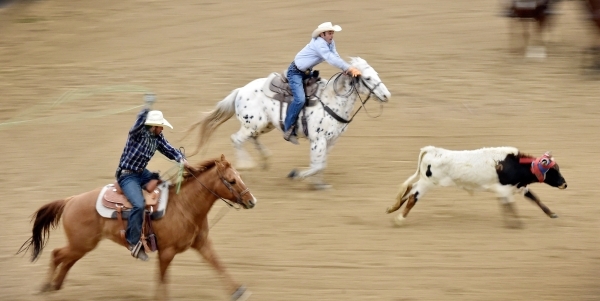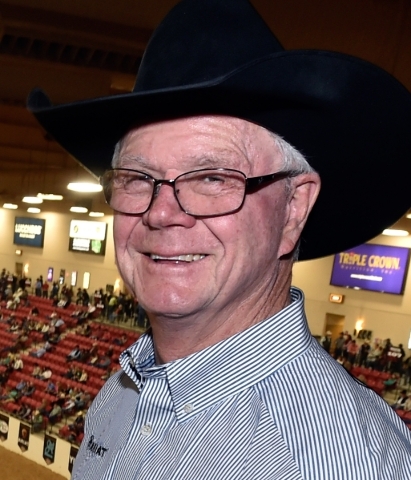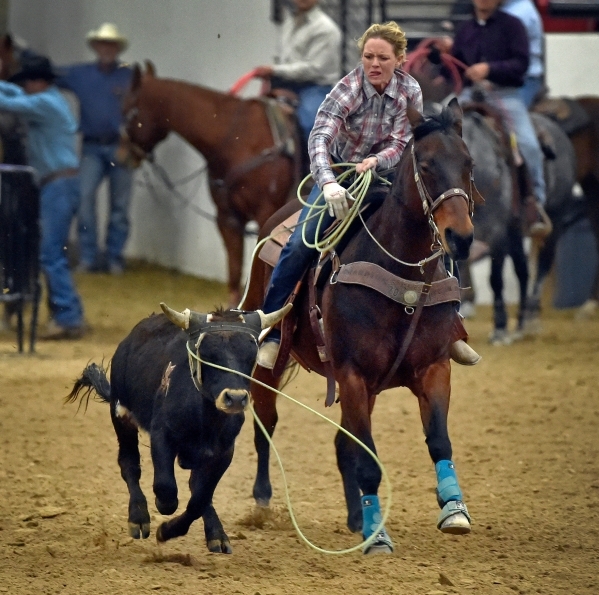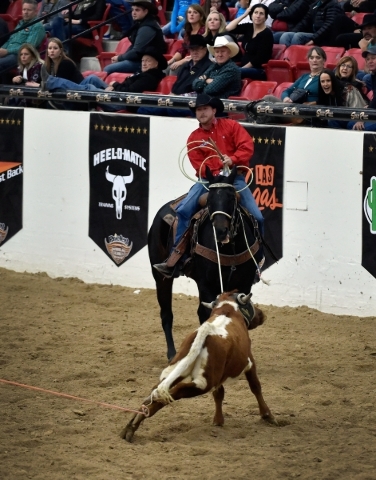Hefty prize purse steers header-heeler duos to World Series of Team Roping
Sure, there a few ringers in the bunch. Sixteen former world champions, actually.
But most are weekend rodeo warriors, ranch hands, amateur cowboys, lawyers, doctors, bankers, local Las Vegas politicos, and even a stuntman/part-time actor and former NFL player thrown in. And a golf tournament-style handicapping system makes it all competitive.
They're all chasing a chunk of the hefty prize money of $10 million that has been doled out in $1.5 million pieces daily at the World Series of Team Roping from Dec. 7-13.
The National Finals Rodeo over at The Thomas & Mack Center attracts more than 17,500 fans a night to watch more than 100 of the best professional cowboys ride bucking horses and wrestle steers, but there are 3,500 two-man amateur roping teams at South Point chasing a juicy paycheck.
The World Series of Team Roping's whopper of a purse is remarkable prize money because the contestants over at NFR only began receiving that same amount this year after event founder and organizer Denny Gentry paid out $10 million last year while the cowboys at NFR split $6.375 million in 2014.
"People can't comprehend so much money is being won" at the World Series of Team Roping, said Ryan Growney, South Point general manager. "I don't think anyone could have envisioned (10 years ago when the event started) we would pay $10 million to a bunch of team ropers."
Noted contestant Geronimo Alvarez from Tucson, Ariz.: "I'm here for the big money. You can't rope anyplace else for that money."
Each day for seven days at the World Series of Team Roping, Gentry hands out checks totaling more than $1.5 million, with the day's winning team drawing at least $250,000.
That's a sweet payout for two mounted riders working together to rope and secure a 2-year-old steer in less than 10 seconds. The first roper is known as the "header" who usually ropes the steer's horns, while the "heeler" ropes the animal by its hind feet. When the steer is stretched out, the time is marked. Winning times vary depending on the cowboy's roping talent.
Gentry's technology at South Point's equestrian arena even includes screens and computers for instant replays in a back room, where staffers can check teams' times by replaying videos.
"With this amount of money at stake, you need to have instant replay," Gentry said.
Active Interest Media, based in El Segundo, Calif., with Efrem Zimbalist III serving as CEO, owns the team roping event.
The World Series of Team Roping has a simple business model, but a very different one from NFR.
At the World Series of Team Roping, each team pays varying entry fees from $1,500-$4,000 depending on their skill level, generating $12 million in event revenue. There is no ticket revenue because admission is free at South Point.
Gentry — considered the "Godfather of Team Roping" — distributes checks totaling $10 million while managing the event with a $2 million budget. That helps pay for 85 workers, including 12 full-timers, and $250,000 in cowboy goodies such as saddles and buckles.
At NFR, called the "Super Bowl of Rodeos," the event's sanctioning body, Professional Rodeo Cowboys Association, has a deal with Las Vegas Events (LVE) to have LVE sell the tickets and recruit sponsors to help generate revenue toward the $10 million in prize money. Even with sold-out crowds every night, Las Vegas Events will lose money because of this year's increased prize money of $10 million.
With both NFR and the World Series of Team Roping each paying out $10 million to its contestants, both events rank in the top five equestrian-based events in the world in terms of competition payouts.
And both take place at the same time in the same town.
"How many towns in the world can put on two of the richest equestrian events during the same week,?" Growney asked. "It's testament to the number of rooms we have (in this market). They both have the cowboys, the horses and the ropes, but separate business models."
On Saturday alone, Gentry was expected to dole out $2 million in prize money split among 44 teams. Saturday's top team was expected to draw $360,000, while the 44th finisher was expected to receive $6,000.
"That's the attraction," contestant and lawyer Lucy Bishop, of Temecula, Calif., said of the lure of the prize money.
Piped in fellow contestant Jody Stamper, who lives outside Tulsa, Okla.: "You have fun and make money too."
Gentry, a former cattlemen's association executive, envisioned a "well-heeled" demographic with money to spend as his contestants when he launched the first World Series of Team Roping in 2006 when the total prize money was $1.2 million.
And doctors and lawyers do show up.
"Even surgeons are here handling the ropes. If a surgeon cuts any part of his hand, he's out of business," Gentry said.
But a decade of team roping competition has proved that the competitors come from every walk of life and every economic class.
"There's a lot of people who want to go for the money and they're not necessarily well-heeled," said Gentry, a friendly, soft-spoken event organizer who draws dozens of greetings from team ropers at South Point every day.
The cowboys may be amateurs at the World Series of Team Roping, but they still have to pile up some team roping earnings at events during the year to qualify for Las Vegas.
In all, about 25,000 team roping duos compete through a yearlong season that runs from October to October, but only 3,500 teams that generate a minimum $5,000 in annual winnings get to qualify for the World Series of Team Roping and have a chance to secure one of the 900 steers that are needed to run out of the chute for the giant event.
Growney doesn't see how the World Series of Team Roping can grow because there are so many team ropers in town that they buy out all 3,000 horse stalls at South Point and at other local sites. He noted the 3,000 stalls were sold out back in April.
Gentry acknowledged the event has grown as nearly as big as it can get.
"This thing has maxed out primarily because of the number of stalls," he said.
Contact reporter Alan Snel at asnel@reviewjournal.com Follow him on Twitter: @BicycleManSnel























